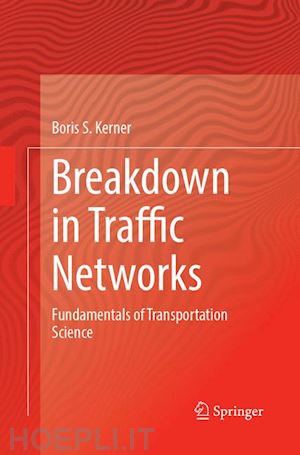
Questo prodotto usufruisce delle SPEDIZIONI GRATIS
selezionando l'opzione Corriere Veloce in fase di ordine.
Pagabile anche con Carta della cultura giovani e del merito, 18App Bonus Cultura e Carta del Docente
This book offers a detailed investigation of breakdowns in traffic and transportation networks. It shows empirically that transitions from free flow to so-called synchronized flow, initiated by local disturbances at network bottlenecks, display a nucleation-type behavior: while small disturbances in free flow decay, larger ones grow further and lead to breakdowns at the bottlenecks. Further, it discusses in detail the significance of this nucleation effect for traffic and transportation theories, and the consequences this has for future automatic driving, traffic control, dynamic traffic assignment, and optimization in traffic and transportation networks.
Starting from a large volume of field traffic data collected from various sources obtained solely through measurements in real world traffic, the author develops his insights, with an emphasis less on reviewing existing methodologies, models and theories, and more on providing a detailed analysis of empirical traffic data anddrawing consequences regarding the minimum requirements for any traffic and transportation theories to be valid.The book
- proves the empirical nucleation nature of traffic breakdown in networks
- discusses the origin of the failure of classical traffic and transportation theories
- shows that the three-phase theory is incommensurable with the classical traffic theories, and
- explains why current state-of-the art dynamic traffic assignments tend to provoke heavy traffic congestion,
making it a valuable reference resource for a wide audience of scientists and postgraduate students interested in the fundamental understanding of empirical traffic phenomena and related data-driven phenomenology, as well as for practitioners working in the fields of traffic and transportation engineering.Introduction. The Reason for Paradigm Shift in Transportation Science.- Achievements of Empirical Studies of Traffic Breakdown at Highway Bottlenecks.- Nucleation Nature of Traffic Breakdown – Empirical Fundamentalof Transportation Science.- Failure of Generally Accepted Classical Traffic Flow Theories.- Theoretical Fundamental of Transportation Science – The Three-Phase Theory.- Effect of Automatic Driving on Probability of Breakdown in Traffic Networks.- Future Automatic Driving based on Three-Phase Theory.- The Reason for Incommensurability of Three-Phase Theory with Classical Traffic Flow Theories.- Time-Delayed Breakdown at Traffic Signal in City Traffic.- Theoretical Fundamental of Transportation Science – Breakdown Minimization (BM) Principle.- Maximization of Network Throughput Ensuring Free Flow Conditions in Network.- Minimization of Traffic Congestion in Networks.- Deterioration of Traffic System through Standard Dynamic Traffic Assignment in Networks.- Discussion of Future Dynamic Traffic Assignment and Control in Networks.- Conclusions and Outlook.- Kerner-Klenov Stochastic Microscopic Model in Framework of Three-Phase Theory.- Kerner-Klenov-Schreckenberg-Wolf (KKSW) Cellular Automaton (CA) Three-Phase Model.- Dynamic Traffic Assignment based on Wardrop’s UE with Step-by-Step Method.- Glossary.- Index.











Il sito utilizza cookie ed altri strumenti di tracciamento che raccolgono informazioni dal dispositivo dell’utente. Oltre ai cookie tecnici ed analitici aggregati, strettamente necessari per il funzionamento di questo sito web, previo consenso dell’utente possono essere installati cookie di profilazione e marketing e cookie dei social media. Cliccando su “Accetto tutti i cookie” saranno attivate tutte le categorie di cookie. Per accettare solo deterninate categorie di cookie, cliccare invece su “Impostazioni cookie”. Chiudendo il banner o continuando a navigare saranno installati solo cookie tecnici. Per maggiori dettagli, consultare la Cookie Policy.